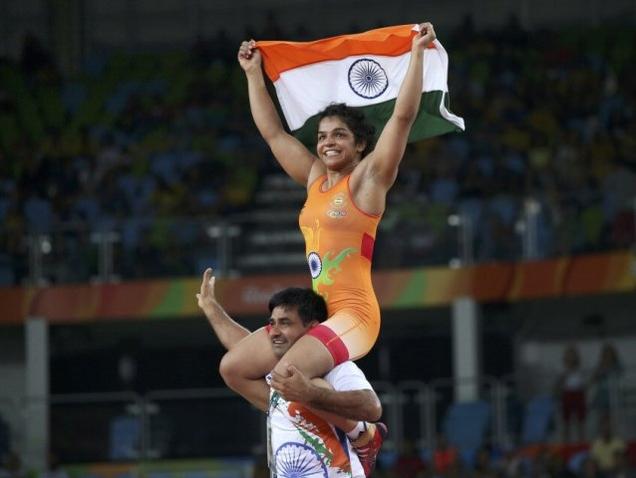Rio De Janeiro, August 18 (Indian media): Sakshi Malik got India its first medal at the Rio Olympics when she won her 58 kg freestyle bronze medal bout against Aisuluu Tynybekova of Kyrgyzstan. She prevailed 8-5 on technical points in a late comeback, defying the early 0-5 lead of her opponent. The final result saw her prevail 3-1 on classification points. The medal came through repechage after she had earlier been eliminated in the quarters.
“I was confident all along. I always felt I would win. I did not back down and kept pushing. This is historic for Indian women wrestlers,” said the elated 23-year-old after the win. “This is the result of over ten years of hard work. I feel proud and special that I could get this medal for India,” she said.
India had attained freedom at midnight. Not many reading this got a chance to know how it felt. Sixty-nine years and three days later, about three hours past midnight, Sakshi Malik liberated India from thoughts of returning from the Olympics empty handed. After three and six medals from the last two editions, respectively, zero would have been some letdown indeed.
Not a force in global sport despite the hauls from Beijing and London, India was expecting a few podium places this time. A biggest ever contingent of 118 participants had heightened those expectations. This was not without reason because Jitu Rai, Saina Nehwal and Shiva Thapa are medal winners from the last editions of their respective world championships. While the failure of these and other big names quickly killed hopes of surpassing the tally of six, a flurry of fourth-place finishes started raising the spectre of nothing at all instead.
From that point of view, the Haryana wrestler’s comeback from 0-5 in her last bout in the repechage round is freedom, from something that the nation would have been at pains to come to terms with. There can still be other Indians on the Rio podium, but Sakshi’s bronze will burn bright because it lifted India from the brink of that empty feeling those born before Leander Paes’ 1996 bronze are so familiar with. India has not drawn a blank in the Olympics since. One from six would be a significant slide, but a country used to nothing for a considerable period might more than embrace it.
Sakshi’s success also lifts the gloom surrounding Indian wrestling. Despite producing three medals in the two previous editions of the Games, the sport had its image damaged in the Sushil Kumar selection episode and the Narsingh Yadav doping conspiracy. Now, wrestlers can say with justifiable pride that like shooters in 2004, 2008 and 2012, they too have won medals in three successive Olympics and that wrestling has overtaken shooting as India’s most productive Olympic sport in terms of individual medals (five and four).
Other than that, the 23-year-old’s display of pluck should inspire the remaining Indian contenders in the last few days in Rio, especially in wrestling. In a team atmosphere, an individual’s brilliance often brings fresh energy to the group. The world of sports has witnessed many incidents of one sparkling performance rejuvenating a sagging campaign. There was enough in Sakshi’s fairytale fightback to lift drooping shoulders and stimulate others to accept the challenge of surpassing themselves.
Sakshi Malik scripted history by becoming the first woman wrestler from India to bag an Olympic medal and only fourth female athlete from the country to climb to the podium at the biggest sporting event in the world. Overall, Sakshi has won India’s fifth wrestling medal in the Olympic Games. It is India’s 25th medal in Olympic Games.
Who is Sakshi Malik?
Weight: 64 kg
Height: 1.62 metres
Born on September 3, 1992, in Rohtak, Haryana, Sakshi Malik has her supportive parents, Sudesh and Sukhbir, to thank for encouraging her in her unusual career choice.
The 23-year-old from Mokhra village began her training in wrestling as a 12-year-old under the guidance of Ishwar Dahiya at an akhara in the Chotu Ram stadium. Her grooming was helped along by having to fight a lot of boys, in a region where the sport was ‘not for girls’. In fact, Dahiya faced protests from locals when he took Sakshi under his wing.

The run-up to Rio
2010: By the age of 18, she had tasted victory at junior-level competitions. She won a Bronze at the 2010 Junior World Championships in the 59-kg category.
2014: She first came to the international limelight after taking home the Gold at the Dave Schultz International Wrestling Tournament (60-kg).
July-August 2014: Her professional international career began with a silver medal in the 2014 Commonwealth Games in Glasgow, courtesy two 4-0 bouts.
September 2014: She crashed out in the Quarterfinal at the World Wrestling Championships in Tashkent. But not before beating her Senegalese opponent 4-1 in the Round of 16.
May 2015: Then on to the Senior Asian Wrestling Championships in Doha, where she won the Bronze.
“My silver at the 2014 Commonwealth Games is my personal favorite. Although I displayed some aggressive wrestling at the 2015 Asian Championships and clinched a bronze, my bout at Glasgow was more challenging,” Sakshi said.
Following that, Sakshi booked her seat on the flight to Rio by winning Bronze in the Summer Olympics Qualifiers, defeating Chinese Lan Zhang in the semifinal, at Istanbul.
July 2016: She won 60-kg Bronze at the Spanish Grand Prix.





























































